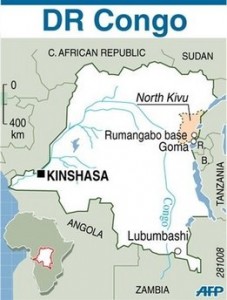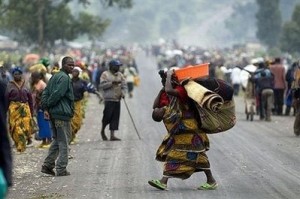 Today, every rich country in the world is struggling to cope with an unprecedented credit crunch that has us all worried about our economic welfare. And I appreciate that this global meltdown might cause many of you to be somewhat less sympathetic to my sounding an alarm about yet another humanitarian crisis unfolding in Africa.
Today, every rich country in the world is struggling to cope with an unprecedented credit crunch that has us all worried about our economic welfare. And I appreciate that this global meltdown might cause many of you to be somewhat less sympathetic to my sounding an alarm about yet another humanitarian crisis unfolding in Africa.
Nevertheless, I feel obliged to note that Congo is teetering on the brink of full-scale civil war … again, which threatens to confirm my worst fears about it aping the genocide in Rwanda with a vengeance. In fact, here’s how the Associated Press reported yesterday on this latest flare up:
The unrest in eastern Congo has been fueled by festering hatreds left over from the Rwandan genocide and the country’s unrelenting civil wars. Renegade Gen. Laurent Nkunda has threatened to take Goma despite calls from the U.N. Security Council for him to respect a cease-fire brokered by the U.N. in January.
But perhaps I can evoke a little sympathy by clarifying that this is not an appeal for more humanitarian aid for Africa. Because the best way you can help the millions whose lives are now in peril is by calling on your national leaders to lobby President Bush to deploy US forces to help the U.N. enforce its ceasefire.

After all, history has shown that the U.N. forces have demonstrated reliable fecklessness in the face of rebel forces intent on genocide. Indeed, this is why the US established AFRICOM just months ago – as a rapid response force to prevent humanitarian crises and military conflicts in Africa from escalating into genocide.
What are they doing? They are supposed to protect us!
[AP quoting Jean-Paul Maombi, a 31-year-old nurse, complaining about the failure of UN forces to prevent rebel forces from invading Goma, forcing tens of thousands to flee their homes]
Related Articles:
DR Congo’s election … portending civil war
AFRICOM…
Genocide in DR Congo: Rwanda with a vengeance…
E. Encinas says
Africom has 2 major goals on the continent, containing terrorism in the war on terror and securing oil supplies on the continent. There are no stated intentions to conduct humanitarian intervention, only to act as “support”. So harboring any belief that they will act militarily to contain this escalating humanitarian crisis in any significant way is misinformed and naive.
Anthony L. Hall says
E.
Your regard for AFRICOM is understandably cynical. But I’m afraid it is woefully uninformed. But never mind what I think, here’s how Brigadier General Jean De Martha Jaotody, Head of Operations and Support Unit of the African Union expressed his regard for AFRICOM during an address in Stuttgart, Germany on Oct 17, 2008:
U.S. Africa Command [AFRICOM] and the African Union [AU] share a common mission: preventing conflict and promoting stability in order to address the root cause of underdevelopment and poverty on the continent… Stability and prosperity in Africa are important to the long-term interest of the United States. The AU believes that AFRICOM represents an opportunity to strengthen and expand United States and African relationships in this regard.
E. Encinas says
And I’m afraid that your response is extremely optimistic though appreciated. You also unfortunately selected a quote from an AU general, who speaks from “the belief that AFRICOM represents…” not from what AFRICOM has clearly stated its mission is. In your post you write:
“Indeed, this is why the US established AFRICOM just months ago – as a rapid response force to prevent humanitarian crises and military conflicts in Africa from escalating into genocide.”
However, the AFRICOM website and the head of AFRICOM, General William Ward, make it very clear that there will be a partnership with “African friends” but that AFRICOM’s participation will fall squarely in the realm of assistance, not the sort of rapid response cavalry-talk your statement seems to suggest. Taken from the AFRICOM website:
“The creation of U.S. Africa Command does not mean the U.S. military will take a leading role in African security matters” (1.41 AM, Nov 1, 2008)
http://www.africom.mil/AboutAFRICOM.asp
With these statements the devil is always in the details, and all the official AFRICOM statements I have come across have pointedly left out references to humanitarian crises and genocide. If you can show me an official statement from AFRICOM that specifically refers to directly addressing these sorts of crises then maybe there is some hope for the DR Congo after all.